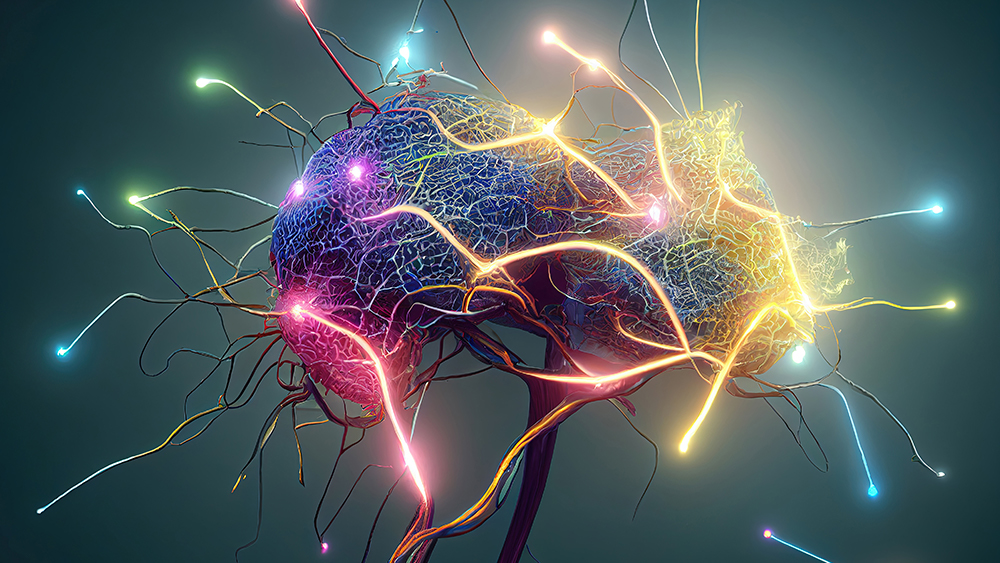The muscle-brain connection: Resistance and strength training exercises help protect brain health
07/30/2025 / By Olivia Cook

- Resistance and strength training exercises help protect brain health by boosting memory, preserving brain volume and improving cognitive function – even reversing signs of mild cognitive impairment (MCI) in some older adults.
- Yours muscles are for more than just movement. It acts as an endocrine organ, releasing myokines and IGF-1 that reduce inflammation, enhance brain resilience and support neuron growth and repair.
- Strength training increases BDNF – a brain-supporting protein that promotes learning, memory and neuroplasticity – helping the brain adapt and stay sharp with age.
- Just two 45-minute sessions per week of strength or resistance training – along with daily movement like gardening, household chores or walking – can offer measurable mental and physical benefits.
- Exercise, diet and sleep work together. Muscle activation through exercise stimulates brain repair, while anti-inflammatory foods and restorative sleep amplify those effects – helping seniors stay independent, balanced and mentally resilient.
It is no secret that aging changes the body. But what if your muscles were quietly working overtime to help your brain age smarter, not just slower?
That’s the emerging science behind resistance and strength training, two forms of exercise that go far beyond biceps and bench presses. New research shows they could help older adults push back against brain shrinkage, memory loss and even early-stage cognitive decline. And the best part? You don’t need a gym membership or a six-pack to start.
A groundbreaking study published in GeroScience in early 2025 tracked 44 older adults with mild cognitive impairment (MCI), a condition often considered a precursor to Alzheimer’s disease. Half of the participants followed a supervised strength training routine twice a week for six months. The results were striking.
Those who trained preserved more gray matter in brain regions impacted by Alzheimer’s, such as the hippocampus and precuneus. They also improved their memory and some participants no longer met the clinical criteria for MCI by the study’s end.
Researchers emphasized that strength training isn’t just about building muscle. It is about preserving mental resilience. The study suggested that muscle strength could serve as a buffer against neurological decline.
It is helpful to know the difference between two often interchangeable terms:
- Strength training usually refers to lifting heavier weights to build muscle mass and power.
- Resistance training is a broader umbrella that includes bands, body-weight exercises, machines or anything that makes your muscles work against resistance.
They serve slightly different purposes, but both offer significant brain-boosting benefits. Integrating either or ideally both into a routine can help enhance balance, mobility and the one thing many older adults fear the most: loss of independence.
Your body has more than 600 muscles – and they’re not just for movement. Researchers now recognize muscles as a hormone-secreting organ. When muscles contract, they release myokines, chemical messengers that travel through the bloodstream and communicate with your brain, reducing inflammation and supporting metabolic health.
Muscle activity also boosts the production of BDNF (brain-derived neurotrophic factor), a protein often described as fertilizer for the brain. BDNF enhances neuroplasticity, or the brain’s ability to adapt, reorganize or rewire and grow new neural connections throughout life, especially in response to experience, learning or recovery from injury.
Scientists are also zeroing in on IGF-1 (insulin-like growth factor 1), a hormone released during strength training. Once produced, IGF-1 enters the brain and supports communication between brain cells, neuron survival and synaptic repair. It may be one of the key players linking physical strength to sharper cognition.
According to recent findings, when people strengthen their muscles, they’re not only building physical capacity – they are activating complex biological pathways that help the brain stay adaptable, energized and resilient.
How exercise protects your aging brain
Regular movement is one of the most powerful ways to support lifelong cognitive function. Here’s how exercise helps protect the aging brain:
- Increases blood flow and oxygen delivery to the brain
- Stimulates neurogenesis (growth of new cells), which contributes to neuroplasticity
- Elevates levels of BDNF for better learning and memory
- Reduces inflammation and insulin resistance – both linked to cognitive decline
- Lowers the risk of vascular damage, a major contributor to dementia and Alzheimer’s
Multiple studies suggest that combining aerobic and resistance training provides the most comprehensive protection, even reversing some forms of brain shrinkage associated with aging. (Related: 7 Tips for older adults to avoid injury during exercise.)
As you age, you naturally lose muscle mass in a process called sarcopenia (muscle wasting). But this isn’t just about strength loss. Sarcopenia is associated with greater risk of dementia, depression, frailty and metabolic dysfunction.
With reduced muscle mass, the body produces less myokines and becomes more susceptible to inflammation – both of which impair brain function over time. The relationship between muscle and mind is so strong that some scientists now consider sarcopenia a red flag for cognitive decline.
Building muscle is not just a fitness goal anymore; it is a brain health strategy.
A smarter way to age: Staying sharp and independent
Here’s what resistance and strength training do for your brain, according to research:
- Resistance training improves insulin sensitivity, lowers chronic inflammation and supports executive function – your ability to focus, plan and follow through.
- Strength training enhances attention to detail, working memory and reaction time. It also stimulates the production of IGF-1, which supports neuroplasticity and helps repair damaged brain cells.
These benefits are not hypothetical. In the GeroScience study, participants who trained twice a week for 45 minutes significantly improved memory and preserved key brain structures tied to learning.
Researchers noted that leg-focused exercises, such as squats or step-ups, yielded some of the strongest improvements in cognitive function. These movements activate large muscle groups and help generate higher levels of BDNF and IGF-1.
You don’t need fancy equipment or a personal trainer to benefit. Simple exercises like chair squats, wall push-ups or resistance band rows, can all be done at home. Many communities offer senior-focused classes, and online resources are more accessible than ever.
Consistency is more important than intensity. Two to three days a week of focused resistance or strength training can make a measurable difference – not only in how you move but also in how you feel and think.
And don’t underestimate daily activities. Brisk housework, gardening, going up and down the stairs and walking the dog all count toward physical activity that supports brain health. (Related: Modifiable risk factors that increase your dementia risk and how to address them.)
The best time to work out? Whenever you’re most likely to stick with it. Some studies suggest that morning exercise may sharpen focus for the rest of the day, but consistency trumps timing.
Diet matters, too. Prioritize:
- Lean proteins to support muscle growth and repair
- Anti-inflammatory foods like berries, leafy greens, nuts and seeds
- Brain-nourishing healthy fats, like omega-3 fatty acids from salmon, chia or flax seed
- Plenty of hydration to keep cells functioning optimally
Avoid ultra-processed foods, added sugars and refined oils, all of which can fuel inflammation and blunt the benefits of exercise.
Exercise isn’t just about preventing disease, it’s about maintaining functional independence, emotional balance and connection to the world. Regular exercise helps:
- Reduce dementia risk by up to 45 percent
- Improve balance, cognitive performance and mood
- Support everyday tasks like lifting safety, standing and walking
- Contribute to better energy levels, lower anxiety and good-quality, restorative sleep
Even for those starting later in life, it’s never too late to exercise and build brain resilience. The human body is designed to adapt, even in old age.
Start small, stay consistent and know that every rep (repetition) counts – not just for your muscles, but for your mind.
Watch this video to learn how to prevent Alzheimer’s with resistance training.
This video is from the Daily Videos channel on Brighteon.com.
More related stories:
Start your morning with a great workout – your brain will thank you for it.
Research finds exercise increases brain size, memory function as you age.
Muscles and immunity: How building muscle boosts your immune system.
Sources include:
Submit a correction >>
Tagged Under:
aging secrets, alternative medicine, brain function, brain health, exercise, goodmedcine, health science, longevity, mild cognitive impairment, muscle function, muscle health, natural health, natural medicine, Naturopathy, neuroplasticity, prevention, remedies, research, resistance training, strength training
This article may contain statements that reflect the opinion of the author
RECENT NEWS & ARTICLES
COPYRIGHT © 2017 REAL SCIENCE NEWS




















